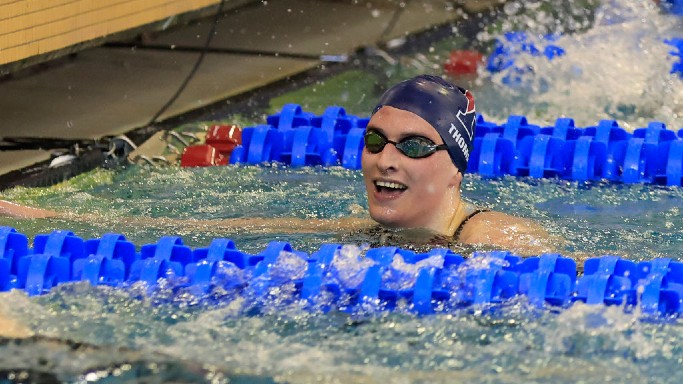The debate over transgender participation in women’s sports is not just one of semantics. It has very real consequences, many of which were put on display last week during the NCAA’s women’s swimming championship.
Lia Thomas, a transgender swimmer for the University of Pennsylvania who previously competed for the school’s men’s swimming team, took home a women’s championship title on Thursday after placing first in the 500-meter freestyle. Thomas finished the race two seconds ahead of the other competitors, two of whom were Olympians.
A picture of Thomas standing on the first-place podium, towering above the girls who placed second and third place, summed up the event nicely. Those girls never had a shot — Thomas’s male physique made sure of that.
Thomas’s participation in the event also guaranteed that a number of women wouldn’t place at all. Because of Thomas’s win, ninth-place finisher Tylor Mathieu was blocked from the championship final and from becoming an All-American, and 17th-place finisher Reka Gyorgy was denied a spot in the consolation final.
For Gyorgy, specifically, this wasn’t just another race, it was her last chance to compete at the collegiate level.
“I’m a 5th year senior,” she wrote in a letter to the NCAA, “I have been top 16 and top 8 before and I know how much of a privilege it is to make finals at a meet this big. This is my last college meet ever and I feel frustrated. It feels like that final spot was taken away from me because of the NCAA’s decision to let someone who is not a biological female compete.”
Gyorgy continued: “I know you could say I had the opportunity to swim faster and make the top 16, but this situation makes it a bit different and I can’t help but be angry or sad. It hurts me, my team, and other women in the pool … Every event that transgender athletes competed in was one spot taken away from biological females throughout the meet.”
Gyorgy and Mathieu are not the only women who have been denied access to high-level athletic competition because of the NCAA’s transgender policies. Linnea Saltz, who competed on Southern Utah University’s track team, said her teammates were forced to run against a male-to-female transgender athlete in 2020 who went on to win first place in the indoor mile. In the middle of that race, Saltz said she overheard the transgender athlete’s coach tell the runner to “slow down.”
“As all of these women are putting everything that they have on the line to go ahead and race their best time of the season as fast as they can, the person that is beating them is being told to slow down,” Saltz said during her testimony before Utah’s legislature. “Taking away our opportunities will run us out of the sports world, which we already had to fight so hard to be a part of.”
Saltz is right. Several female swimmers on the University of Pennsylvania’s team reportedly admitted that they lost the drive to compete because they knew it was “impossible” to beat Thomas. Three Connecticut high school female track athletes who sued the state in 2017 over its transgender policy recalled feeling discouraged after every meet because they had to compete against two male-to-female transgender athletes who won 15 women’s state championship titles. These women aren’t just being denied gold and silver medals; they’re being denied fair competition and the chance to even compete for those medals.
Female athletes deserve better. In fact, they deserve exactly what was promised to them: a level playing field and the opportunity to compete without fear of being displaced by someone who has a distinct and unfair physical advantage. Is that really too much to ask?

